news
SECURITY ISSUES : SANWO-OLU GETS LAGOSIANS’ BACKING TO TACKLE SECURITY CHALLENGES
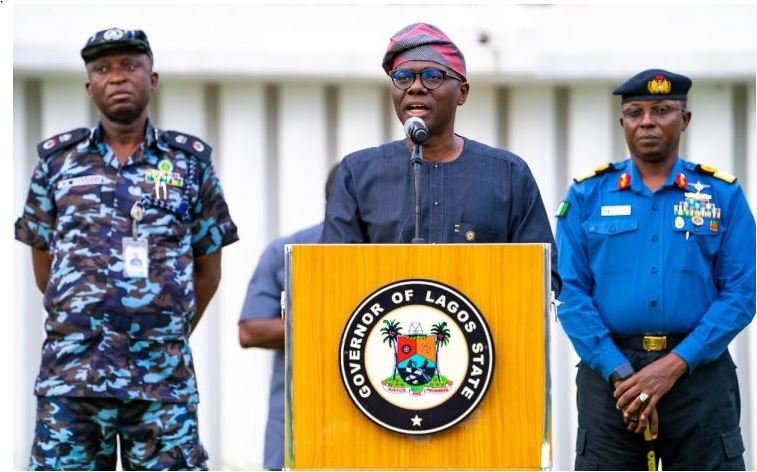

… Stakeholders Seek Action on Okada, Abandoned Buildings, Others*
… Residents Renew Demand for Special Status*
Lagosians have asked the State Government to take decisive actions on some security issues to rein in what they describe as a disturbing trend.
Among others, they demanded action against what many described as the menace of commercial motorcycles, otherwise known as Okada, kidnapping, armed robbery, cult clashes, and violent assaults.
It was all at a Stakeholders’ Meeting on Security held at the Adeyemi Bero Hall, Alausa, Ikeja where Governor Babajide Sanwo-Olu and leading lights in security circles listened to a group of panelists who highlighted the state’s security challenges.
In the audience were religious leaders, the Chief Judge, Justice Kazeem Alogba, military chiefs, traditional leaders, community leaders, students, unionists and members of the State Executive Council.
Governor Sanwo-Olu listed his administration’s efforts in security and assured his audience that a decisive action would be taken on commercial motorcycles, which speaker after speaker described as a means for criminals. Its operators, they said, are unruly, uncouth, rude and brutal. But those who patronise them and the motorcyclists will not be left in the cold.
The Government, Sanwo-Olu said, will be inaugurating the First and Last Mile buses next week, which will ply the routes the motorcycles are plying. Besides, those who have taken up Okada riding for lack of jobs were advised to grab the opportunities in agriculture, wealth creation, poverty alleviation and other government programmes.
Sanwo-Olu said the meeting was convened in response to the growing threat posed by some lawless activities to the safety and security of lives in the State.
The Governor said the string of lawlessness daily witnessed from the confrontation between commercial motorcyclists and law enforcement agencies required an urgent action, stressing that the Government would be announcing reforms in transportation, which will further make changes to the parameters of motorcycle and tricycle operations.
He said: “We have noted with dismay the fact that Okada riders are disregarding and flouting the restrictions we imposed on their activities in certain areas of the metropolis. We have also observed with dismay, the ongoing violent confrontation by commercial motorcyclists against our law enforcement agencies.
“Based on all that we have seen and experienced in the past couple of weeks, as well as the increasing threat posed by the activities of commercial motorcycle operators to the safety and security of lives, we will be announcing further changes to the parameters of motorcycle and tricycle operations in the State in the coming days. No society can make progress amid such haughty display of lawlessness and criminality.”
Sanwo-Olu made it known that the Government would fully implement the State’s Urban and Regional Planning and Development Law of 2019 as amended, which will enable the Government take over and demolish abandoned buildings and construction sites turned into safe haven for hoodlums and miscreants.
He added that the State would strengthen its clean-up exercise of shanties and spots unapproved for settlement, but which had turned to hideouts for criminals.
The State Government, Sanwo-Olu said, would be recruiting more personnel into the Lagos State Neighbourhood Corps (LSNC) to boost intelligence gathering at the community level.
The Governor said the consultative meeting with the stakeholders was necessary to make the State’s security strategy effective and sustainable, noting that all hands must be on deck to work with the Government in collecting, sharing and evaluating credible intelligence that would strengthen security of lives and property in Lagos.
He said: “Lagos must continue to enjoy an atmosphere of peace, safety and all-encompassing security. We are determined to arrest the current security challenges being faced in the State, and we will take every step necessary to deliver on our promises on a safe, secure and livable state. We will also continue to communicate regularly with key stakeholders, and all the residents for updates on the progress we are making.”
Appraising security situation in Lagos, Commissioner of Police, Mr. Hakeem Odumosu, raised alarm over rising security breaches resulting from the menace of Okada operations in the State.
Between January and early this month, Odumosu disclosed, 320 commercial motorcycles were arrested in 218 cases of criminal incidents in which 78 suspects were detained and 480 ammunition recovered.
In the same period, the Lagos police boss said Okada accounted for 83 per cent of 385 cases of avoidable fatal vehicular accidents in Lagos.
He said: “The menace of Okada operators does not end with avoidable accidents. Crime reports from the field have shown that a greater percentage of crimes, ranging from armed robbery, cultism, kidnapping, murder, burglary and stealing, traffic robbery to carjacking and cash snatching from bank customers, are attributable to armed hoodlums who operate on Okada.
“The nuisance constituted by the Okada operators on Lagos roads has become a danger to law abiding citizens. Sections of Lagos populace have come to regard commercial motorcycles as a necessary evil, it has become imperative for the Government to take more drastic measures against their notoriety.”
“The State Police Command strongly advises the State Government to immediately review the current guidelines guiding the operation of Okada as a means of commercial transportation in the State and take decisive legal and administrative steps and policies that will curb their traffic, criminal and other nefarious activities in the State.”
There was a panel of discussion chaired by an award-winning Television Show host, Babajide Kolade-Otitoju, in which residents aired their views on the current state of security in Lagos and across the country.
The discussants expressed concerns on the security implications of allowing operations of Okada and demanded a ‘Special Status’ for Lagos as ethnic melting pot. They also urged the Government to create economic opportunities and vocational engagement for unemployed residents to further lessen crime rates.
Addressing the complaints about criminals hiding in uncompleted buildings and abandoned vehicles within communities, Vice Chairman of Lagos State Community Development Advisory Council, Mr. Rotimi Ayoku-Owolawi said the CDC was ready to support the Government and the police in identifying dark spots and lock-up markets from where criminals launch their nefarious activities.
Commissioner for Information Mr. Gbenga Omotoso described the stakeholders’ engagement as proactive, given a string of security breaches in the country.
He said gone were the days when citizens were at the mercy of pickpockets and amateur criminals; the contemporary crimes, he said, are being committed by armed robbers, bloodsucking bandits and daredevil gangsters.
“We don’t want our Lagos to become an epicenter of evil and criminality,” Omotoso said.
At the end of the stakeholders’ meeting, a 12-point resolution was reached and agreed upon by the participants in public interest.
The resolution reads in part: “Attacks on law enforcement officers and agencies should not be handled with kid gloves. Culprits must be arrested and the full weight of the law brought to bear on such persons.
“Government must take stringent measures to ban the use of Okada as means of transportation in the State; alternatives must be provided by the State Government in Agriculture, Wealth Creation, Women Affairs Empowerment programmes and others.
“Government should take control of abandoned and uncompleted buildings used as hideouts of criminals in the State immediately. The State must take control of abandoned vehicles in its nooks and crannies and seal off houses, hotels and event centres where hoodlums are found to hibernate or where arms are stored.”
SIGNED
GBOYEGA AKOSILE
CHIEF PRESS SECRETARY
news
Renewed Hope : No governor can complain of lack of funds under Tinubu’s administration, Says Sanwo-Olu,
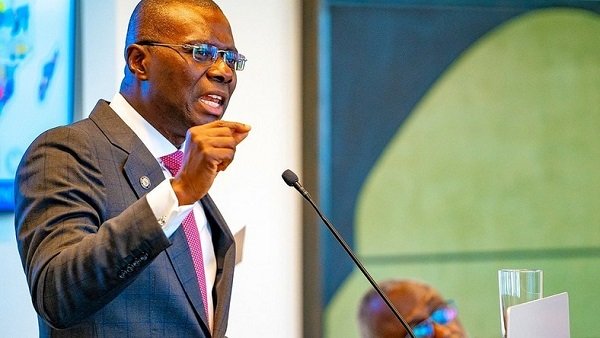
No
Lagos State Governor, Babajide Olusola Sanwo-Olu, has declared that under the administration of President Bola Ahmed Tinubu, no state governor or local government chairman can genuinely complain of a lack of funds.
He said the Tinubu administration has significantly increased allocations to subnational governments, ensuring that states and local councils have more resources to meet their developmental obligations.
Sanwo-Olu stated this on Tuesday, November 11, while delivering the keynote address at a one-day public lecture organized by the Arewa Think Tank (ATT) to commemorate Nigeria’s 65th Independence anniversary at the Arewa House, Kaduna.
The lecture, themed “65 Years of Nigeria’s Independence: The Journey So Far with the Renewed Hope Agenda in View,” brought together political leaders, academics, youth groups, and other stakeholders to reflect on Nigeria’s national progress and future under President Tinubu’s Renewed Hope Agenda.
The Lagos Governor praised the resilience and ingenuity of Nigerians since independence, noting that despite the country’s challenges, its capacity for growth, reform, and unity remains unmatched.
“Today, that story has changed. Ask any State Governor or Local Government Chairman, and they will tell you just how much revenue has surged under the watch of President Bola Ahmed Tinubu. There is now more money to do more that benefits the people of Nigeria,” Sanwo-Olu said.
He attributed the improved fiscal outlook to deliberate policy reforms by the Tinubu administration, particularly those designed to strengthen federalism and empower the states and local governments.
According to him, between 2023 and 2024, federal allocations to state governments rose by about 62 percent, while allocations to local governments increased by 47 percent. He said the recently enacted tax reforms, which reduced the Federal Government’s share of Value Added Tax (VAT) from 15 percent to 10 percent, further underscored the President’s commitment to fiscal decentralization and grassroots development.
“With the new tax laws, states now get 55 percent of VAT, while local governments receive 35 percent. This is another bold step by the President to ensure that governance is closer to the people,” he noted.
Sanwo-Olu also lauded the President’s insistence on local government financial autonomy, recalling the administration’s Supreme Court victory, which secured historic legal backing for that autonomy.
He disclosed that President Tinubu’s next major reform focus is restructuring Nigeria’s security architecture through the creation of State Police, an initiative he described as “long overdue and fundamental.”
Citing Tinubu’s recent remarks during a meeting with Katsina leaders, Sanwo-Olu quoted: “I am reviewing all aspects of security. I have to create a State Police. We are looking at that holistically. We will defeat insecurity.”
He described the Renewed Hope Agenda as a bridge-building framework aimed at uniting Nigeria’s diverse regions through equity, reform, and inclusive development.
“President Tinubu is a veteran unifier and a bridge-builder. His Renewed Hope Agenda is about connecting Nigeria, bridges of reform, prosperity, and national unity,” he said.
Drawing inspiration from Nigeria’s founding fathers, especially the late Sir Ahmadu Bello, the Sardauna of Sokoto, Sanwo-Olu emphasized that true national development must be homegrown and context-specific.
“More than six decades later, Sardauna’s words still ring true. Our duty is to build on those legacies, planting trees we may not sit under, but ensuring a better Nigeria for future generations,” he said.
He reaffirmed that Nigeria’s diversity remains its greatest strength, saying: “We will continue to affirm that Nigeria is a proudly multi-ethnic, multi-religious, and multicultural country. What binds us together is far stronger than what divides us. We shall overcome every challenge, poverty, hunger, and terrorism.”
Sanwo-Olu pledged Lagos State’s continued partnership with the Federal Government in actualizing the Renewed Hope Agenda and building a prosperous, inclusive, and resilient nation.
news
Organ Transplant Scandal : Tinubu engages UK, seeks Ekweremadu’s transfer to Nigeria
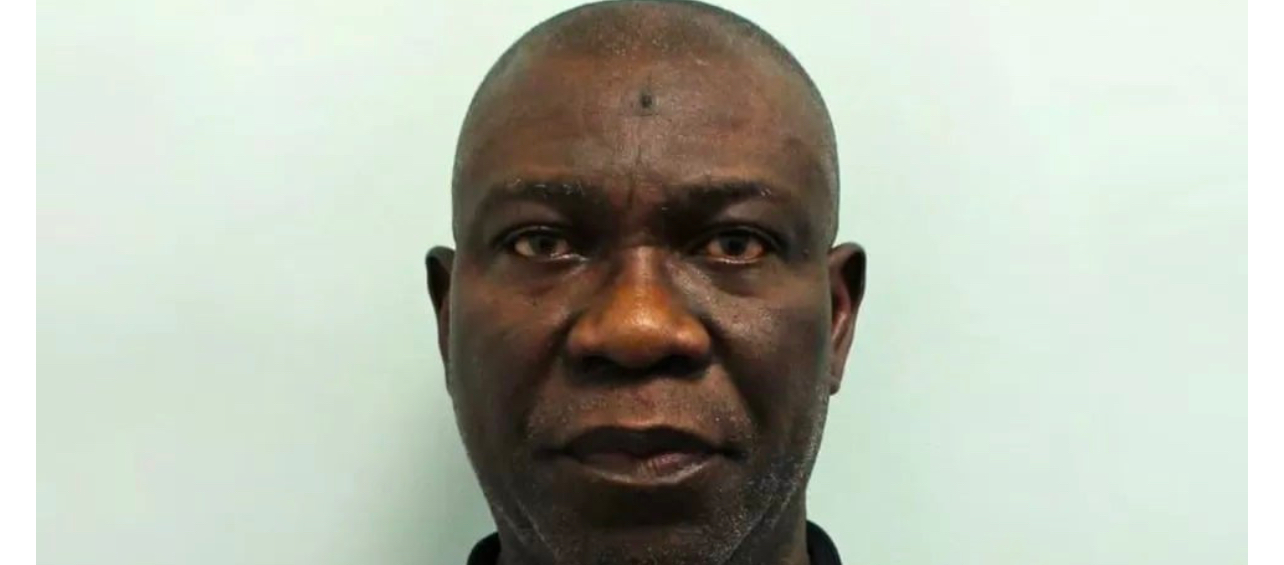
President Bola Tinubu has sent a high-level delegation to London to discuss the case of a former Deputy Senate President, Ike Ekweremadu, who has been serving a prison sentence in the United Kingdom since March 2023.
Newsthumb gathered that the Federal Government is actively seeking arrangements that would allow Ekweremadu to serve the remainder of his sentence in Nigeria.
The delegation, which included the Minister of Foreign Affairs, Yusuf Tuggar, and the Attorney General and Minister of Justice, Lateef Fagbemi, on Monday held discussions with officials at the UK Ministry of Justice regarding Ekweremadu’s incarceration.
Following the meeting, the team was received at the Nigerian High Commission in London by the Acting High Commissioner to the UK, Ambassador Mohammed Maidugu.
Confirming the development to Arise News on Monday night, the spokesman for the Foreign Affairs Minister, Alkasim AbdulKadir, said the consultations with UK authorities are ongoing.
He added that a formal request for a prisoner transfer to allow Ekweremadu to serve the remainder of his sentence in Nigeria has been submitted.
He said, “Consultations are still ongoing with UK authorities on the matter.
“An appeal for a prisoner exchange for him to serve the remainder of his term in Nigeria was tabled before the United Kingdom authorities.”
Our correspondence earlier reported that Ekweremadu and his wife were arrested by the London Metropolitan Police in June 2022, after a man was falsely presented to a private renal unit at Royal Free Hospital in London as a cousin to their daughter Sonia, in what turned out to be a failed attempt to persuade medics to carry out an £80,000 transplant.
Ike Ekweremadu was convicted in the UK for his role in organ trafficking after attempting to bring a 21-year-old Lagos street vendor to Britain for a kidney transplant intended for his daughter, Sonia.
The 21-year-old man, who was allegedly promised work in the UK, reported the matter to the police in May of the same year, stating that he was brought to the country for an organ transplant.
In March 2023, Ekweremadu was found guilty of organ trafficking by a UK court and was later, in May, sentenced to nine years and eight months under the UK Modern Slavery Act.
His wife, Beatrice, received a four-year and six-month sentence and was released early in 2025, while a medical intermediary, Dr Obinna Obeta, was handed a ten-year prison term.
However, in January, Beatrice was released from prison and returned to Nigeria.
The case drew widespread attention, sparking diplomatic discussions between Nigeria and the UK, exposing gaps in transplant regulations, and prompting further investigations in the UK.
news
Warri- Itakpe train derailment: Police parade suspects, CP Kwaimo, Says vandalism is an economic sabotage
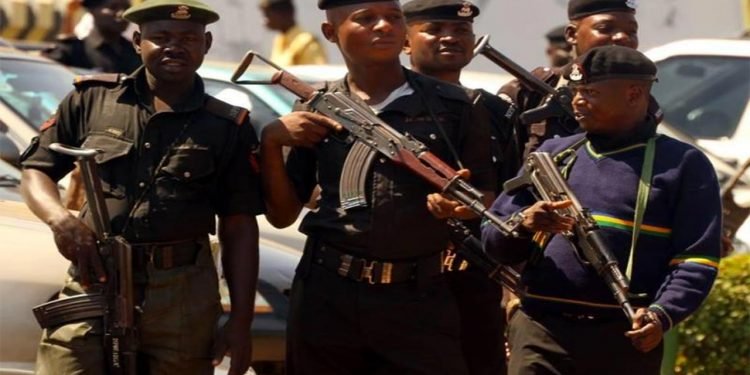
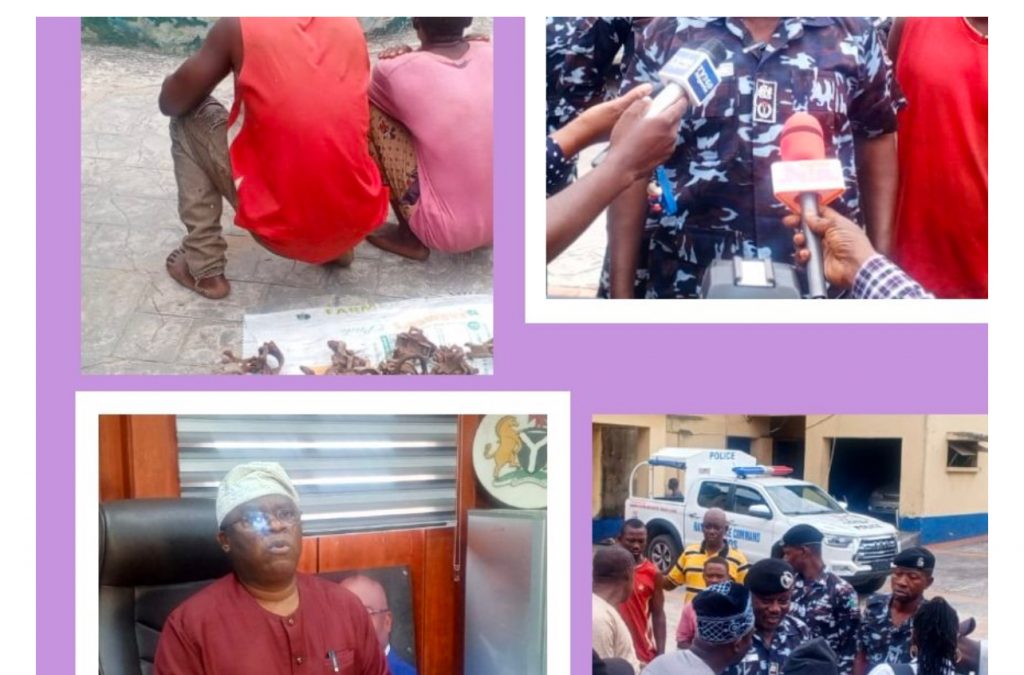
Warri- Itakpe train derailment: Police parade arrested suspects … this act of vandalism is an economic sabotage – CP Kwaimo
…… Railway properties are critical national assets and not scraps, we are going to deploy technology for rail tracks monitoring – Opeifa
The Railway Command of the Nigeria Police Force today Friday 7th November 2025 at it’s headquarters in Ebute Metta, Lagos, paraded the two suspects arrested in connection with the derailment of the Warri Itakpe train service on Sunday 1st of November 2025.
Speaking to newsmen, the Commissioner of Police Nigeria Police Railway Command, CP Vungmoh S.M. Kwaimo, described the vandalism of train tracks as an act of economic sabotage which will be fought to a standstill. According to CP Kwaimo, the suspects, identified as Mudansuru Mutari (male, aged 27) and Blorie Kokori (aged 39), were apprehended around Kilometer 208 before Abraka, Delta State, on Tuesday, November 4, 2025, by operatives of the NRC Police Command in collaboration with local security agents.
CP Kwaimo described the arrest as a breakthrough in the fight against train tracks vandalism in the Agbor Abraka axis. According to him, “We are going all out against the vandals because we have a responsibility to ensure safety of life and property in line with section 4 of the Police Act”.
According to the CP, preliminary investigations and their confessional statements revealed their direct involvement in tampering with vital components of the rail track. He said, “We will pursue this case to see that justice is served”. He also promised to go after the sponsors, some of whom have been identified in Lagos and Agbor.
The CP used the occasion to inform the public that the number of policemen attached to each coach in the operations of the Nigerian Railway is to be increased. He expressed gratitude to President Bola Tinubu, the Inspector General of police and the management team of the NRC for their support and zero tolerance for railway vandalism.
CP Vungmoh Kwaimo at the parade of the suspects was flanked by his officers and men which included DCP Yahaya Mana DC (CID), DCP Toyin O. Sulyman DC (OPS), ACP Ibrahim Audu AC (OPS), among others.
In a similar vein, the president general of the Nigerian Union of Railwaymen comrade Innocent Luka Ajiji who led members of his executive to the parade of the suspects, was full of praise for the new leadership of the Nigerian Railway police command under CP Kwaimo Vungmoh for their tireless efforts in the fight against rail tracks vandalism, just as he commended the management of NRC led by Dr Kayode Opeifa for the reinvigoration and turn around of the Nigerian Railway Corporation and railway men for their commitment to their duty even in the face of challenges and setbacks caused by train tracks vandalism.
Similarly, the managing director and chief executive officer of the NRC Dr Kayode Opeifa while speaking to newsmen in his office, called on states governments to show concern to take ownership of the railway tracks that passes through their states through the provision of infrastructures like motorable roads to the train stations.
Comrade Opeifa reiterated his warning that railway properties are critical national assets and not scraps, and warned vandals and their sponsors to stay away or face the full weight of the law. According to the NRC helmsman, “Railway properties are national assets, stay away, we are changing strategies to secure train tracks, We are deploying technology and the use of local communities to safe guard our train tracks”.
According to Dr Opeifa, “We are prosecuting many arrested vandals of train tracks and will not stop, unless they stay away from our national assets”.
Dr. Opeifa emphasized that the NRC under his leadership remains focused on President Bola Tinubu administration Renewed Hope Agenda and will not compromise in the provision of efficient service delivery and safety of it’s passengers whose comfort is non negotiable.
He identified funding as a major challenge in the operations of the NRC, but noted that the support of states governments remains critical, to enhancing quality and efficient service delivery to the people.
Comrade Opeifa said that the corporation was in talks with the Rural Electrification Agency to provide electricity to the stations and trains tracks to about 500 meters to the train stations. He also called on the members of the national assembly to consider the Nigerian Railway Corporation (NRC) in their constituency projects.
Speaking on the derailed Warri Itakpe train of the 1st of November 2025, Dr Opeifa stated that only two coaches were affected as a result of the removed bolts and clips. He highlighted that over 300 bolts and clips were removed within the axis which caused the derailment, but that the re-railment was concluded within 24 hours, but due to the need to carry out necessary and diligent safety checks, the resumption of train services had to be put on hold temporarily and that train service has resumed on the corridor.
Comrade Opeifa used the occasion of the press briefing to appreciate and commend the commuting public whose loyalty, according to him, “Strengthened our resolve to remain committed and undeterred by the derailment setbacks”.
-

 news5 years ago
news5 years agoUPDATE: #ENDSARS: CCTV footage of Lekki shootings intact – Says Sanwo – Olu
-

 lifestyle5 years ago
lifestyle5 years agoFormer Miss World: Mixed reactions trail Agbani Darego’s looks
-

 health5 years ago
health5 years agoChairman Agege LG, Ganiyu Egunjobi Receives Covid-19 Vaccines
-

 lifestyle4 years ago
lifestyle4 years agoObateru: Celebrating a Quintessential PR Man at 60
-

 health5 years ago
health5 years agoUPDATE : Nigeria Records 790 new cases of COVID-19
-

 health5 years ago
health5 years agoBREAKING: Nigeria confirms 663 new cases of COVID-19
-

 entertainment10 months ago
entertainment10 months agoAshny Set for Valentine Special and new Album ‘ Femme Fatale’
-

 news6 months ago
news6 months agoBREAKING: Tinubu swears in new NNPCL Board


